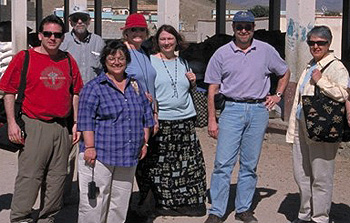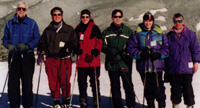Life in laboratory medicine strives for explicit and predictable plans of action: Test A leads either to Diagnosis B or C or to follow-up Test D.
When he looks back on his life so far, though, Jack Ladenson, Ph.D., the Oree M. Carroll and Lillian B. Ladenson Professor of Clinical Chemistry, often finds an entertaining lack of predictability. He laughs loudest when he remembers how long he originally thought he’d stay at Washington University: “no more than three to five years.”

Ladenson came to the University more than three and a half decades ago.
A few years after his arrival, researchers developed the ability to make monoclonal antibodies. The immune system uses antibodies to seek out invaders and label them for attack and disposal. Monoclonal antibodies promised to put the abilities of these molecular bloodhounds at scientists’ disposal.
Around that time, rapid and reliable heart attack diagnosis was a high clinical priority. New treatments were in the pipeline for heart disease, a leading cause of mortality, but to maximize their effectiveness, physicians needed to know quickly if patients were really having a heart attack.
Ladenson and several colleagues found themselves ideally positioned to see if specific monoclonal antibodies could enable quick, accurate heart attack diagnosis.
“All at once, a number of people were anxious to give us research money to develop monoclonal antibodies,” Ladenson says. “That was kind of extraordinary.”
In the mid-1980s, Ladenson’s lab developed a monoclonal antibody that bound to a form of an enzyme, creatine kinase (CK-MB), that was produced mainly in heart cells. Because they were working with several antibodies at the time, Ladenson asked research associate Vonnie Landt to give them names. Landt, an Arnold Schwarzenegger fan, named the CK-MB antibody Conan, after the Robert E. Howard sword-and-sorcery hero brought to the big screen by Schwarzenegger.
After the antibody was licensed to a number of companies and further developed, it became the standard of care applied in hospitals throughout the developed world. Later, Ladenson’s lab developed monoclonal antibodies to Troponin I that provided even more specific heart attack diagnosis. Together, the tests have made the University significant sums of money, at one point providing a fifth of the University’s annual technology licensing revenue.
Paying it forward
Ladenson has put the money from the heart attack tests to multiple good uses, including the endowment of three faculty chairs at the University: the Oree M. Carroll and Lillian B. Ladenson Professor of Clinical Chemistry, the Conan Professor of Laboratory Medicine and the Ladenson Professor of Pathology.
The funds also have sometimes proven helpful to a second major branch of his life’s work that began in 1994. Ladenson still remembers the call he received that year from Heinz Hoenecke, M.D., founder of Pathologists Overseas Inc. When he retired from pathology, Hoenecke, whose parents had been missionaries, decided to cross-train as an internist and go to Africa to serve as a doctor. That trip led to two revelations for Hoenecke, according to Ladenson.
“The first was that he was a lousy internist,” Ladenson says. “And he’ll tell you that — it’s just so easy to like this guy. But the second was that he had seen very, very poor pathology and diagnostic services, and there was a real opportunity for improvement in these areas.”
Soon, Ladenson was taking the first of many overseas trips to countries like Eritrea, Kenya and Bhutan to see what he and others could do to help. Among his discoveries: The best way to learn what diagnostic services are most in need is to ask the country’s own health-care professionals.
“All of us who guessed what would be the most utilized tests in Eritrea guessed wrong,” he says. “It was a very useful lesson: Do not presume you know more than the people in a country just because they happen to be poor and born in an underdeveloped place.”
|
Jack Ladenson |
Born: April 8, 1942
Education: B.S., Pennsylvania State University; Ph.D., University of Maryland at College Park Family: Wife, Ruth; daughter, Michele, and son-in-law, John Zhong; son, Jeff, and daughter-in-law, Lauren; grandchildren Henry Zhong and Jonas, Elsa and Zella Ladenson.
|
If a clinical test is needed in Eritrea and the test substance in the patient’s sample can survive the logistical challenges imposed by transport from that country, Ladenson has worked out a system to have the test performed at Barnes-Jewish Hospital and interpreted by WUSTL faculty. As testing starts to be performed in the country, Ladenson has developed a network of corporate donors of diagnostic equipment.
“There are companies with hearts,” he says. “They’re out there. If some initially tell me no, I don’t mind. I just keep trying.”
In many ways, Ladenson has become an expert recruiter. He has learned how to find and develop relationships with foreign governmental officials who are most willing and able to help improve health care in their countries. And he regularly identifies young, established medical professionals interested in spending weeks or even years overseas.
David Windus, M.D., professor of medicine, has joined Ladenson on several trips to Eritrea and Bhutan. The trips started after a diabetes test became available in Eritrea that had been in use in the United States since the 1960s and ’70s.
“They now had access to a test, hemoglobin A1C, which showed there was a problem in diabetes patient management, so what should they do about it?” Ladenson says. “I didn’t feel comfortable just throwing my hands up, so I got together this small group that included two diabetes clinicians, diabetes nurses and diabetes educators.”
Windus, Jason Goldfeder, M.D., assistant professor of medicine, and the rest of the team went to Eritrea to study how patient management could be improved. The group’s efforts blossomed into clinical training courses for physicians and nurses and eventually led to the creation of Eritrea’s first certified diabetes nurse practitioners.
“Jack has this remarkable vision for how a small group of dedicated people can advance health care in a developing country,” Windus says. “He sees how so many different things fit together: the quality of equipment, the stocking of testing materials, the training of clinicians and the ability of physicians to use the information the labs produce, to name just a few examples.”
Windus attributes Ladenson’s dedication to a strong egalitarian streak: equal access to good care.
Ladenson speaks with wonder of bringing life-saving tests to Third World nations that are taken for granted in the United States.
“When I first became involved in this work, it was frustrating because ‘What can I do?’ was the central question,” he says. “But now I think we’ve kind of figured out a general way to approach some of these problems.”
New challenges
Ladenson is interim director of the Division of Laboratory and Genomic Medicine.

“Jack is a sophisticated clinical chemist who made a strong commitment to the growth and development of our laboratory and genomic medicine division, which is one of the very best,” says Emil R. Unanue, M.D., the Paul and Ellen Lacy Professor and former head of pathology and immunology. “Jack’s apparent laissez-faire attitude, which we all enjoy, is combined with effective and accomplished leadership.”
Ladenson hopes to step down from the interim directorship soon. He’s going to stay active in research and in Pathologists Overseas, but he and his wife, Ruth, recently purchased a house in Vermont where they want to spend some time with their family, friends and dogs.
Ladenson’s personal hobbies include collecting old material related to sports and politics. He frequently has a table at national shows.
“I started this years ago as a communications device with my then-teenage son,” he says. His son is now busy with other things, but Ladenson has continued it, finding it a great stress release.
His son, Jeff, a specialist in foreign disaster relief, now lives in Morocco with his wife, Lauren, a U.S. foreign service officer, and their three children. His daughter, Michele, a cultural anthropologist, lives in Texas with her husband, John, a pediatric anesthesiologist, and a newborn son.
“We try to stop by Morocco or Texas when we can,” Ladenson says. “Ruth and I both enjoy visiting the children and grandchildren as often as possible.”